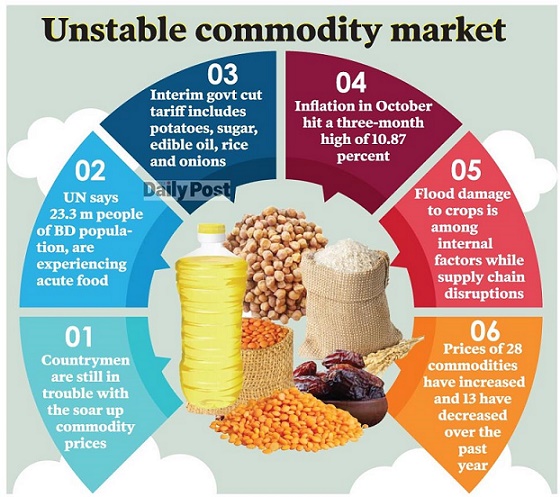# Interim govt cut tariff includes potatoes, sugar, edible oil, rice and onions
# Countrymen are still in trouble with the soar up commodity prices
# Inflation in October hit a three-month high of 10.87 percent
# UN says 23.3 m people of BD population, are experiencing acute food crisis
# Flood damage to crops is among internal factors while supply chain disruptions
In order to tackle unstable commodity market, the interim government has cut import duties on several items in the past three months to boost supplies in its battle against inflation.
But countrymen are still in trouble with the soar up commodity prices. They complained that they have to manage their livelihood by shortening their necessity lists.
Meanwhile, the interim government he cut tariff includes potatoes, sugar, edible oil, rice and onions. However, even amid the tightening and cuts, inflation in October hit a three-month high of 10.87 percent thanks to soaring food prices, especially for rice and vegetables.
In October, food inflation hit 12.66 percent while non-food inflation declined 16 percentage points to 9.34 percent, according to the Bangladesh Bureau of Statistics. To monitor the market and review the supply chain of essential commodities, the Ministry of Commerce formed a 10-member special task force at the district level.
The Integrated Food Security Phase Classification, published by international agencies including the United Nations (UN) in early November, says that nearly 23.3 million people, or 26 percent of Bangladesh's population, are experiencing high levels of acute food insecurity.
In the meantime, flood damage to crops is among internal factors while supply chain disruptions and market syndication, kitchen market ills the interim government inherited continue to fuel price spirals.
A data from the state-run Trading Corporation (TCB) showed prices of medium rice, non-brand loose soybean oil, palm oil, potatoes, onions, garlic and cardamom have increased in the past week.
The Department of Agricultural Marketing, which publishes daily retail prices of 54 commodities on its website, showed that prices of 28 commodities have increased and 13 have decreased over the past year.
Analysing the market trend of broiler chicken, beef and chilis, a trade body recently pointed the finger at inefficient market mechanisms for price hikes of kitchen essentials.
Besides, the Dhaka Chamber of Commerce and Industry (DCCI) in October blamed high production and transportation costs, limited bargaining power due to market structure inefficiency, seasonal supply, price fluctuations and limited market access for producers as triggers for food inflation.
The DCCI study recommended strengthening the supply chain by reducing intermediaries and importing essential food items that are in short supply due to imbalances between production and demand.
It also suggested implementing a tracking system for cash memos of local and imported food items and providing subsidies for key agricultural inputs like fertiliser, oil and electricity to lower production costs.
The prices of some commodities, including edible oil, palm oil, sugar and wheat, have recently increased on the global market.
According to World Bank data, palm oil prices rose by $94 per ton in October compared to September. During the same period, soybean oil prices rose by $51 per ton, wheat prices by $13 per ton and sugar by $4 per ton.
After talking with a grocer named Rahim at the Mirpur-1 kitchen market in the capital, he said prices of many daily essentials have increased over the past two or three months, forcing people to tighten their belts. Customers who used to buy 3 dozen eggs now buy 1 or 1.5 dozen. Those who used to buy 5 kg of flour are now purchasing 2 to 3 kg.
Rafid Hossain, a private employee who was shopping at the Mirpur kitchen market, said that prices of many daily necessities are still very high. I think the government needs to do more in this area. If people do not feel relieved, it does not matter how many price cooling measures you have taken.
Taslim Shahriar, senior assistant general manager at Meghna Group of Industries, one of the biggest local commodity importers and processors said that due to the reduction of duties, the price of sugar in the local market has come down slightly and will decrease further. The price of edible oil had been increasing at an abnormal rate on the international market for the past one and a half months. Due to this, the government reduced the import duty, but the price of soybean and palm oil may remain high in the country's market. The global wheat prices also jumped, but prices had decreased a bit recently. Import flows have also increased.
ZH






